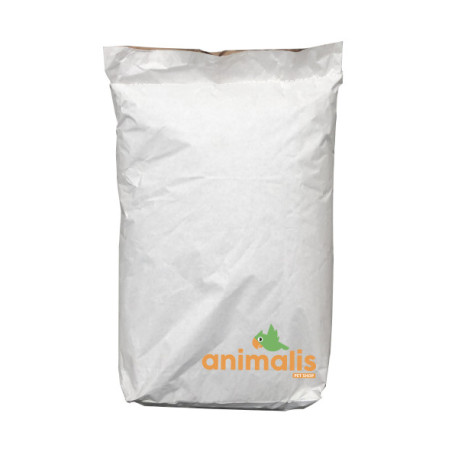



Reference: 443-HOE
The milk thistle seed has hepatoprotective properties. It is therefore excellent for our birds to prevent liver problems.
The milk thistle seed possesses hepatoprotective properties. It is therefore excellent for our birds to prevent liver problems as a precautionary measure.
Milk thistle seeds primarily consist of:
- Flavolignans: silymarins, the liver-protecting agents,
- Flavonoids: quercetin, kaempferol, apigenin, etc.,
- Amines: tyramine, histamine, etc.,
- Lipids: fixed oils (30% oleic acid, 6% palmitic acid), phytosterols,
- Carbohydrates (38%),
- Proteins (23%).
Oatmeal or peeled oats are used in the composition of the basic mixtures of canaries and hooked beaks especially during the breeding and feeding period.
Its protein level is quite low, but it is a seed rich in energy.
Crude protein: 13%
Fat: 8%
Carbohydrates: 68%
Phosphorus: 0.4%
Calcium: 0.09%
The Cardy seed is rich in protein and linoleic acid, which helps reduce cholesterol levels and therefore decreases the risk of heart disease. It is found in mixes for budgerigars and parrots, but also for native birds such as bullfinches.
Cardy seeds are high in fat. The amino acid proportions of the seed are very favourable, with a very high arginine content. The seed is low in lysine and methionine + cystine, while tryptophan is completely lacking.
Canary grass is a nutritious seed particularly appreciated by many birds. Its high protein and fibre content makes it an essential food for the good health and vitality of birds. It is especially ideal for canaries, budgerigars, serins, and other small exotic birds.
Characteristics:
- Ingredients: 100% natural canary grass.
- Appearance: Elongated seeds, from pale yellow to light brown in colour.
- Nutritional Value: Rich in proteins (about 16%), fibres, and essential amino acids.
- Benefits:
- Promotes good digestion thanks to its fibre content.
- Contributes to the shine of plumage.
- Provides the necessary energy for birds' daily activities.
Onion seeds are rich in minerals, vitamins, and antioxidants.
Chenopodium quinoa is an annual plant, one to two meters tall or more. The central stem is cylindrical at the collar and becomes more angular higher. It can be unique or have many ramifications, with a diameter ranging from one to eight centimeters and a height of 0.5 to 3 m, depending on the varieties and growing conditions such as seeding density or fertilization9. Its color is also very variable: uniformly green, green with purple or red streaks, or uniformly red.
Clover stimulates the immune system and slows down cellular ageing through its excellent antioxidant properties. Rich in vitamins B, C, E and provitamin A.
Extra wheat, very good quality, for all types of birds and ornamental animals, pigeons, chickens, parrots, parakeets, doves...
Paddy rice seed or raw rice is perfectly suitable for exotic birds with strong beaks such as the Java sparrow and Asian-origin birds. This seed is also appreciated by parakeets, parrots, and exotic doves.
Birds like to remove the shells from peanuts and then eat the peanuts. Peanuts are a source of energy, which is very important for the long winter months.
Unpeeled peanuts can be given to parrots as a treat.
Clover stimulates the immune system and slows down cellular ageing through its excellent antioxidant properties. Rich in vitamins B, C, E and provitamin A.
Thanks to its small black or pretty electric blue seeds, the poppy is recognizable among thousands. A cousin of the poppy, the poppy is known for its content of good fats and micronutrients essential for the proper functioning of the body.
Aleppo pine seeds (large) for parakeets, parrots, crossbills... is a natural pine seed, a delight for your birds, this seed also has therapeutic virtues, it can be added to the seed mixture or in a separate feeder.
Radish seeds have antioxidant, detoxifying, draining, and decongestant properties.
Baked and crumbled wheat biscuit.
Rusk is particularly suitable for the absorption of moisture in food.
Also ideal for mixing additives (vitamins, dyes, etc.) in food
Ideal for moistening egg pie.
Composition: wheat, water, salt and yeast.
Flaxseed is rich in omega 3, which is essential for the cardiovascular system.

The milk thistle seed has hepatoprotective properties. It is therefore excellent for our birds to prevent liver problems.
